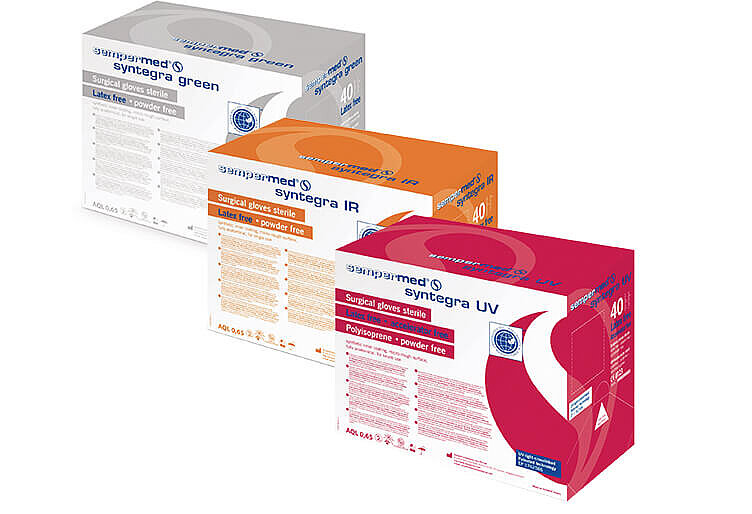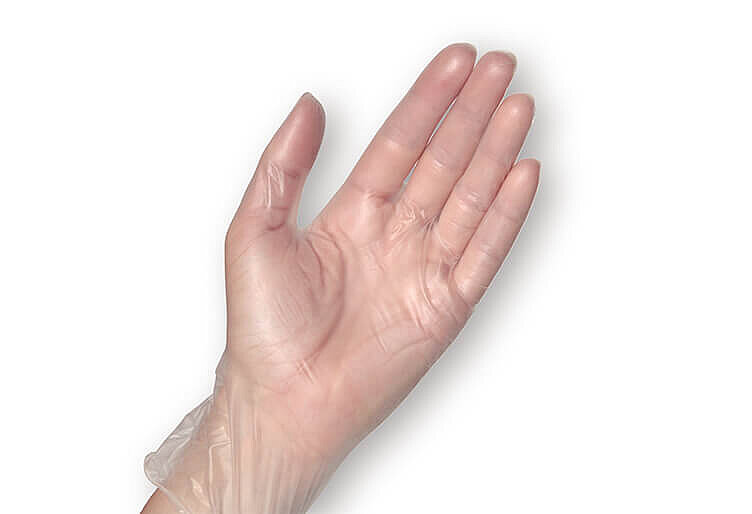
What you need to know about glove materials
Natural latex, Nitrile, Polyisoprene or Vinyl?
Gloves can be made from a variety of materials. The most commonly used raw materials for the production of gloves are natural rubber latex (generally referred to as latex), nitrile butadiene rubber (or simply, nitrile) and polyvinylchloride (commonly called vinyl or PVC gloves). We also use synthetic polyisoprene to manufacture certain products. However, not every material is suitable for every use. Every glove material has different chemical properties and thus is only suitable for its intended use.
Let us briefly go through the advantages and disadvantages of the four glove materials Sempermed uses, so you can choose the right glove.

Latex - the 'classic' glove material
Latex gloves are made of natural rubber latex, which is harvested from rubber trees, also known as Hevea brasiliensis. Latex offers a good resistance against many acids and alkalis. However, they are permeable to many solvents. Due to excellent elongation and a low modulus, latex gloves are very comfortable to wear. They offer the best fit and feel.
A disadvantage of natural latex is that its proteins can cause or trigger latex allergies.
Surgical and examination gloves are often latex gloves. They are used for example in primary care, hospitals, etc. Learn more about our latex glove portfolio here.

Nitrile gloves
The 'allrounder' glove material
Nitrile gloves are made of nitrile butadiene rubber (NBR), which is a synthetic material. It is a suitable alternative for people with a known latex allergy - or those who seek to prevent an allergy. Another advantage is the enhanced resistance to many chemicals, particularly to organic substances.
Nitrile gloves are versatile and can be used in many different applications, ranging from medical use to food contact and industrial use.

Polyisoprene gloves
Latex properties without latex allergies
A synthetic alternative to latex is synthetic polyisoprene. It has the same physical properties as natural rubber latex: maximum elasticity and tear resistance. However, this material is synthetically made. Thus, it does not contain rubber proteins and is therefore free from latex allergens.
Polyisoprene is most commonly used in surgical gloves, usually to enable glove users to continue working with gloves despite having a latex allergy. Additionally, an increasing number of healthcare institutes switch to polyisoprene as a precautionary measure to prevent new allergies. View our polyisoprene glove portfolio now.

Vinyl Gloves
The skin-friendly alternative
Vinyl gloves are an economical alternative for applications where mechanical stress and barrier protection are less important. The skin-friendly material is suitable for users suffering from a latex or chemical allergy.
One drawback is that the use of plasticizers as a major component in the production of vinyl gloves disqualifies them from handling fats and fatty foodstuffs. This glove material is widely used in areas such as nursing or geriatric care, professional cleaning & hygiene.
Sempermed Glove Tips
Our glove tips for the right application
- Use the type of glove and material suited to the task.
- Check gloves for defects before use.
- Treat gloves carefully, where possible.
- Avoid mechanical stress of the glove (e.g. snagging or tearing).
- If possible, use powder-free, low-allergen gloves.
- Disinfect and dry hands properly before using gloves.
- Always put gloves on with clean and dry hands immediately before contact with the patient.
- Change damaged, soiled or wet gloves immediately.
- Use disposable gloves only once.
- Do not disinfect hands while wearing gloves.
- Apply hand care consistently, but do not use care products before wearing gloves.
- Wear two pairs of gloves if one or more of the below applies:
- When the risk of perforation is high.
- During hour-long operations.
- If there is a special risk of infection.
- Intraoperative glove changes are necessary if one or more of the below applies:
- At the slightest suspicion of micro-perforations.
- If the glove slips.
You want to know more?
Read our Glove Guide and learn more about what glove to choose for your application.